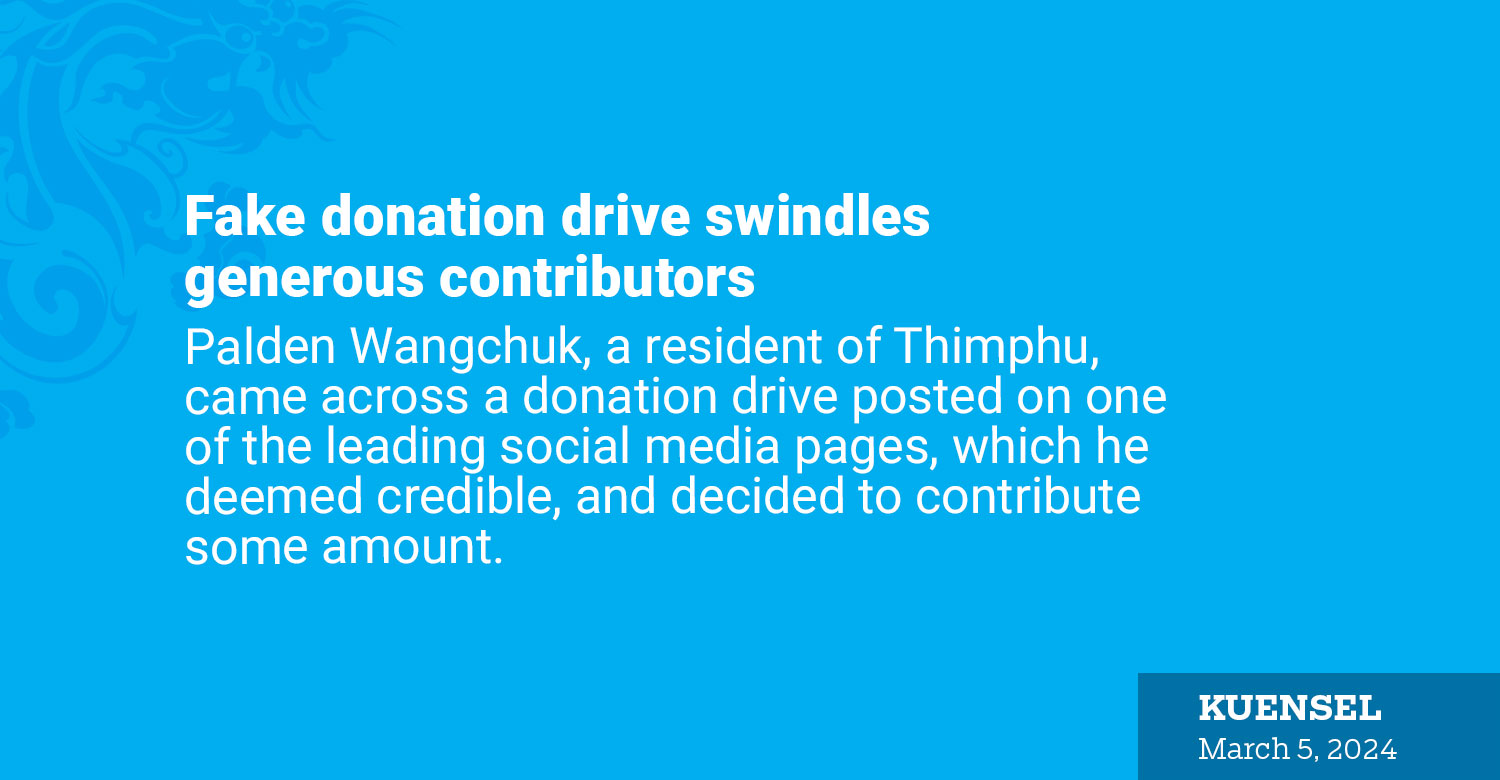YK Poudel
Palden Wangchuk, a resident of Thimphu, came across a donation drive posted on one of the leading social media pages, which he deemed credible, and decided to contribute some amount.
He then shared it on his Facebook timeline and other groups, hoping to offer assistance. However, it was later revealed that the post was a scam.
The perpetrator behind the scam has been apprehended, and the case is currently under police investigation for further interrogation and potential charges.
Similar to Palden, 1,150 generous donors contributed about Nu 500,000 to what they believed was a genuine cause—a fundraiser supposedly aimed at financing a stem cell transplant for a 14-year-old boy in Kolkata, India.
Donations ranging from Nu 5 to Nu 10,000 poured in from across the nation, reflecting a display of empathy and solidarity. The drive collected a sum of about Nu 501,060 within just two days, between February 21 and 22.
Karma Dorji, officiating Chief from the Department of Law and Order, explained that the fraudulent fundraising drive was launched on Facebook by an individual on February 21, which caught the attention of the division during a routine crowd funding monitoring on social media.
“Upon investigation, it was discovered to be a case of fraud,” Karma Dorji said. “The DLO took action to halt the fake donation.”
“The Royal Monetary Authority’s Financial Intelligence Department, in consultation with the bank, imposed restrictions on deposit and withdrawal activities in the account,” he said. “The bank subsequently froze the account on February 22.”
According to Karma Dorji, Nu 22,740 has already been transferred to other accounts belonging to various vendors. “During a random crowd funding monitoring on social media, the case came into our notice.”
“The utilization of the collected funds from this drive is yet to be determined,” he said. “It’s uncertain whether the money will be refunded to all the donors or utilized for other genuine cases requiring public support. Since some funds have already been utilized, there’s administrative confusion regarding reimbursement.”
“The police investigation will determine the charges for the criminal act,” he added. “Under the Penal Code of Bhutan 2004, the case falls under forgery, which is a felony of the third degree. The perpetrator could face imprisonment for a minimum of three years and a maximum of less than five years.”
Karma Dorji emphasised the Department of Law and Order’s commitment to transparency and integrity and mentioned the establishment of the Management of Crowd Funding and Donation Drive in June 2021.
“Currently, 18 applicants have received approvals for fundraising, with 6 currently under treatment,” he said. “Our focus for donation drives is primarily on medical treatments for those genuinely in need.”
The crowd funding process follows strict compliance with the law, requiring applicants to apply for donations with a recommendation from the hospital.
“We do not accept applications from patients who are already receiving referral support, as the donations are solely for those in genuine need,” Karma Dorji clarified. “The department reviews applications and authorizes funds in genuine cases.”
Once the authorized amount is transacted, the account does not accept further deposits. “The DLO and banks monitor the transaction process to ensure compliance,” he said.
The department has encountered three fake donation drives between 2021 and 2024.
According to the statistical yearbook of the police 2022, 12 forgery cases were recorded.
Established in 1988, the Department of Law and Order monitors activities with implications for national security as one of its mandates.


